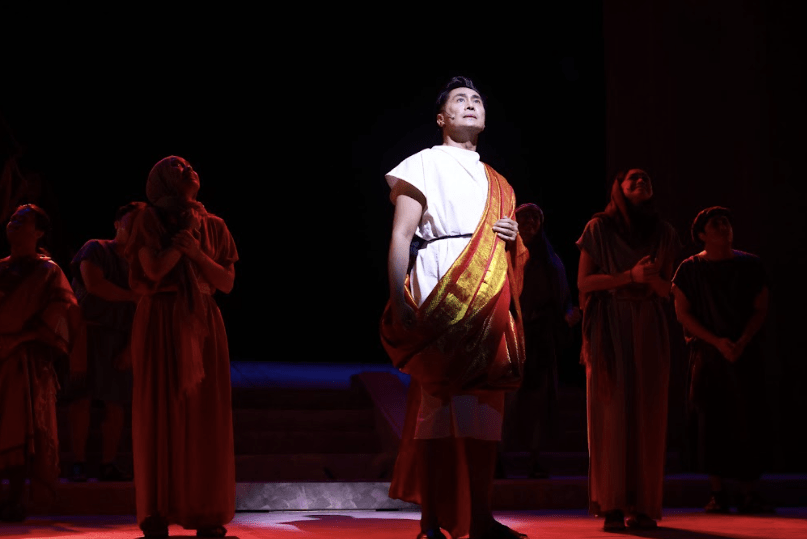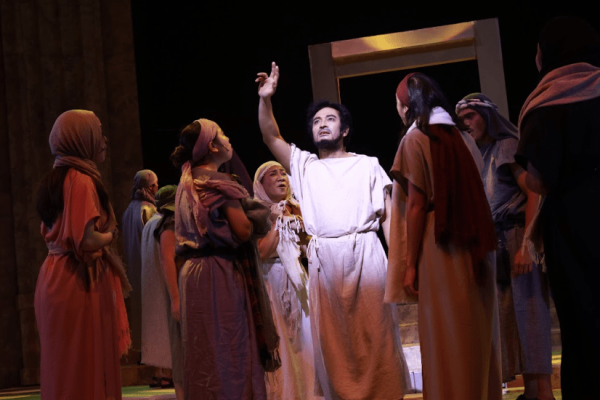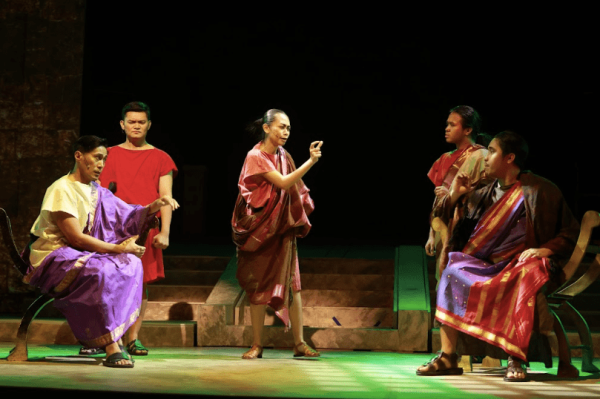
REVIEW: ‘Pilato’ musical is an onerous experience
In the lead-up to Holy Week, Pilato positions itself as a timely meditation on one of the most reviled and enigmatic figures in Christian history. You might expect something overtly religious or provocatively anti-religious. Instead, Pilato, staged by The Corner Studio at PETA Theater Center, skirts both extremes in favor of a dense, tonally confused, and ultimately exhausting attempt at a socio-political musical biopic. Clocking in at a staggering three hours and thirty minutes, the production is less an interrogation of truth and legacy than it is an overlong, underbaked first draft.
The premise is promising: told through the eyes of Josepho, a fictional biographer played by Onyl Torres, Pilato seeks to humanize the Roman prefect whose name has become eternally bound to the crucifixion of Jesus. For much of the show, however, Pontius Pilate (played by Jerome Ferguson) is more bystander than protagonist. The narrative meanders through the many political tensions and players of the era—Jesus, Caiaphas, Herod, Roman advisors—with Pilato largely uncompelling until the very end, when a solitary scene suggests he may regret that Jesus’ death became his defining legacy. But by then, the show has dragged on for hours, testing the patience of even the most devout theatergoers.

Noel Rayos as Hesus; Photo Credit: The Corner Studio
Written and directed by Eldrin Veloso, Pilato suffers most from its book’s excesses. Nearly every scene feels padded, every moment overextended. The first act feels like it could have ended multiple times, only to persist with yet another song. While the text is in deep Filipino—not too difficult to understand—it is far from accessible, burdened with verbosity and Roman and Hebrew words peppered in.
The music, composed by Yanni Robeniol with arrangements by Alexander John Villanueva and musical direction by Pauline Arejola, is mostly relentlessly one-note. For most of the show, it drones forward with the unyielding cadence reminiscent of a pasyon—a devotional chant associated with Holy Week, where the faithful recite or sing a narrative of Christ’s passion in hypnotic repetition. In a religious context, the effect is meditative. In a theater, over three and a half hours, it’s numbing.
Some songs offer hints of emotional texture, but they are swallowed by a deluge of melodrama and lack of character clarity. Procla (Christy Lagapa), Pilato’s wife, sings numerous overwrought solos that seem designed to add a feminine interiority to the show, but her presence is unclear, her motivations muddled, and her arc painfully artificial and frankly, unnecessary.
The performances across the board are rough, with Ferguson’s portrayal of Pilato bordering on robotic. His physicality is stiff and mannered, often maintaining a strange, fixed gesture as though he’s not meant to be a person that’s usually in motion. The only noteworthy performance came from Marit Samson as Publius, who brought some glimmer of actual comedic chops and dynamism to a lifeless ensemble.

L-R: Jerome Ferguson, Ard Lim, Marit Samson, Chan Rabutazo, Thor Ganchero; Photo Credit: The Corner Studio
Veloso’s direction does little to invigorate the dense material. Transitions are mostly marked by dimmed lights and slow exits, with little sense of momentum or dramatic build. The lone moment that felt remotely shaped by directorial intention comes nearly three hours in, as Josepho questions the validity of the “truth” presented so far, and the show rewinds to revisit key scenes. Even this device, however, felt less revelatory and more like another test to the audience’s attention span—replaying a story we had already endured for hours.
Scenic and costume designer Tsard Chua gives us an arc, with projections (by Bene Manaois) to indicate shifts in setting. Characters are costumed in vaguely ancient garb—malongs and sandals abound—without much effort toward historical accuracy. Lighting by Ian Torqueza and movement direction by choreographer Daniel Wesley do little to elevate or distinguish the show’s visual language.
The show’s endless monotony of tone, pacing, and staging encourages disengagement. Its thematic gestures toward “truth” and historical re-examination are too vague to provoke any real intellectual response, and its emotional stakes are too hollow to leave a mark. At best, it invites curiosity to Wikipedia Pilate later. This is a show that demands far more than it gives, and if there’s truth to be found in its telling, it remains deeply buried beneath hours of inertia.
Tickets: P2,200 (VIP), P2,000 (Orchestra Center), P1,500 (Orchestra Side and Lower Balcony Center), P1,200 (Lower Balcony Side and Upper Balcony Center)
Show Dates: April 4-13, 2024
Venue: PETA Theater Center
Running Time: approx. 3 hours and 30 mins (w/ 15 min intermission)
Company: The Corner Studio
Creatives: Eldrin Veloso (writer and director), Pauline Arejola (musical director), Yanni Robeniol (music composer), Alexander John Villanueva (Music Arranger), Tsard Chua (scenic and costume designer), Daniel Wesley (choreographer), Ian Torqueza (lighting designer and technical director), Bene Manaois (projection and video designer)
Cast: Jerome Ferguson (Pilato), Onyl Torres (Josepo), Christy Lagapa (Procla), Noel Rayos (Hesus), Jeremy Manite (Caiaphas), Marit Samson (Publius), Chan Rabutazo (Decimus), Ard Lim (Marcus), Mika Espinosa, VJ Cortel, Julia Panlilio, Hiro Delos Reyes, Misha Fabian, Robert Macaraeg, Francel Go, Darwin Lomentigar, Cynthia J. Santos, Thor Ganchero


Comments